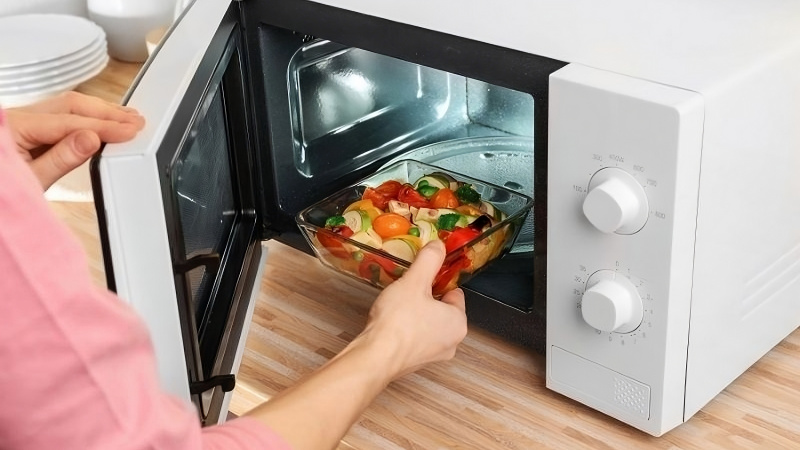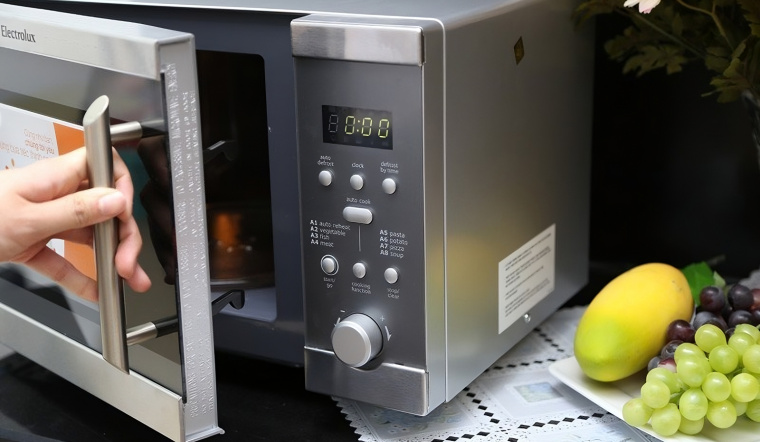In our kitchens, the microwave is a very common item. However, many people often encounter the problem of a noisy microwave after a period of use, which can be quite annoying. In this article, we will discuss the reasons why the microwave is loud when used and provide solutions to fix it.
1 Reasons why the microwave is loud
There are several reasons why a microwave becomes loud after a period of use:
- Cooling fan: After using the microwave, the inside of the microwave remains hot. The cooling fan operates to cool down and dissipate heat from the components. If the microwave door is suddenly opened, the cooling fan cannot stop completely, resulting in a loud noise.
- Lack of cleaning: Over time, dust accumulates inside the microwave and the cooling fan. If not cleaned regularly, the dust can obstruct the cooling process and cause the components inside the microwave to heat up. This leads to inefficient cooling and increased noise.
- Dry fan bearings: The microwave fan uses lubricating oil to reduce friction and noise. If the fan is not regularly lubricated, the oil can dry out and create abnormal loud noises.
- Overloading the microwave: Continuous usage of the microwave without allowing enough time for the components to cool down can result in annoying noises.
- Blocked heat vents: Microwaves have heat vents to reduce the internal temperature. Blocking these vents can prevent the heat from escaping, causing loud noises.
- Malfunctioning cooling fan: After a long period of use, the cooling fan inside the microwave may break or encounter problems, leading to inefficient heat dissipation and abnormal noises.
- Misaligned turntable: In some cases, the turntable inside the microwave may not align properly with the rotating shaft, causing loud and uneven noises during operation.

Reasons why the microwave is loud
2 How to fix a loud microwave
To fix a loud microwave, you can try the following methods:
- Give the microwave resting time: Allow the microwave to rest between cooking sessions so that the components can cool down and prevent overheating. This helps reduce noise and avoid overloading.
- Clean the microwave regularly: Regularly cleaning the microwave removes dirt that could obstruct the cooling process and increase the noise level.
- Lubricate the cooling fan: Check the cooling fan of the microwave and lubricate it if necessary to ensure smooth operation and reduce unwanted noise.
- Place the microwave in a suitable location: Properly position the microwave on a flat, well-ventilated surface, and avoid blocking the heat vents with objects to allow effective heat dissipation.
- Check the turntable and rotating shaft: If strange noises occur during operation, check the alignment of the turntable and rotating shaft. Adjust them as needed to ensure proper alignment.
- Call for maintenance service: If the above steps do not solve the problem, turn off and unplug the microwave, then take it to a maintenance store or contact the manufacturer’s technical service for professional repairs.

How to fix a loud microwave
3 Safe microwave usage guide
Before using the microwave:
- Check the microwave: Ensure that the microwave is in proper working condition and that the microwave door is tightly closed.
- Read the user manual: Thoroughly read the accompanying user manual to understand the functions and proper usage of the microwave.
- Ensure safe operation: Avoid placing flammable or metallic materials near the microwave to prevent fires or explosions.
During the use of the microwave:
- Use appropriate dishes and plates: Use microwave-safe utensils specifically designed for the microwave.
- Set the correct cooking time: Ensure that the appropriate cooking time is set to avoid overcooking and potential fire hazards.
- Keep a safe distance: Always maintain a safe distance when opening the microwave door and avoid placing hands or face too close to the control panel to prevent burns.
After using the microwave:
- Handle food with care: Use a clean cloth or oven mitts when removing food from the microwave to prevent burns.
- Check the microwave’s status: After use, ensure that the microwave is completely turned off.
- Clean the microwave regularly: Regularly clean the microwave to remove accumulated dust inside and outside.
- Avoid running the microwave empty: Never run the microwave without any food inside, as this can cause fires.
How to place food in the microwave:
- Evenly distribute food on the turntable: When using the turntable, make sure to evenly distribute the food. This helps ensure even cooking, as the rotating turntable distributes heat evenly.
- Flip the food during cooking: Especially with larger-sized food, flip the food halfway through the cooking time to promote even cooking on both sides and prevent burning or uneven cooking.

How to place food in the microwave
In this article, we have discussed the reasons why microwaves become loud when used and provided solutions to fix the issue. We hope that this information has been useful to you. Thank you for reading!
If you often do the opposite of these things, then you are sabotaging your household appliances yourself
Below you will find some secrets to provide you with a range of useful maintenance tips to help you better maintain your appliances while extending their working lifespan.



































